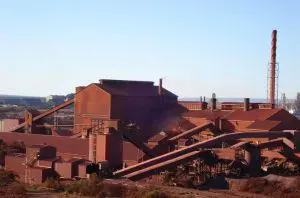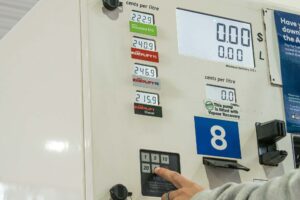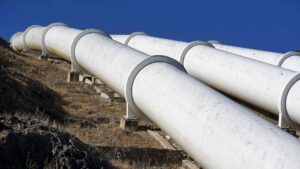
GVK Hancock Coal’s plan to exploit deposits containing over 7 billion tonnes of coal in the Galilee Basin are all but officially dead after the Australian railway company Aurizon wrote off its investment and declared the project worth zero.
Aurizon, a major coal rail carrier in Australia, stated in its half-yearly results released yesterday that it had written off A$30 million it had invested in a new railway proposed to cater for GVK Hancock Coal’s proposed Alpha, Kevin’s Corner and Alpha West coal mines in Queensland.
The $30 million written off, the company stated (p. 28), “represents directly attributable development costs such as engineering designs, environmental and building approvals, which could be recovered through the regulatory process at a future date. However a decision has been made to impair these costs due to uncertainty surrounding the project’s timing and the current market outlook.”
“The carrying value of the project is now nil,” Aurizon bluntly concluded. Without a railway line, the project is effectively dead.
The big dreams of a coal minnow
Back in March 2013 Aurizon and GVK Hancock Coal announced they had entered into a non-binding agreement to jointly investigate the construction of a 500-kilometre long railway from the Galilee Basin to a new coal terminal at Abbot Point.
All going well, Aurizon would become a 51 per cent shareholder in Hancock Coal Infrastructure which would own the railway and related port infrastructure. At the time the companies estimated the project would cost about A$6 billion.
GVK Hancock Coal’s primary interest was in being able to get up to 60 million tonnes of coal a year from the three massive new mines to the global market.
Like many other players in the industry, Aurizon management believed the boom-time hype that global demand for coal would keep on growing and prices would remain high. The fundamentals of export coal, the company insisted at its late 2013 annual general meeting, were “solid and sustainable.”
Aurizon, the privatised re-incarnation of the Queensland Government’s QR National, was keen to pitch its newfound investors a growth story and coal was a big part of its vision. “We have a keen eye for growth and we’re investigating the huge potential of Queensland’s last vast coal reserve in the Galilee Basin,” Aurizon’s website states.
However, as the global coal market began to sour in late 2013, GVK Hancock Coal and Aurizon trimmed their ambitions back to a 300-kilometre-long new railway to connect into its existing line to the Abbot Point coal terminal. Even with the changes, the rail and port upgrades were still expected to cost A$6 billion.
Gunupati Venkata Krishna Reddy, the founder and chairman of Indian-headquartered GVK, persuaded Australia’s richest woman Gina Rinehart to sell a major stake in Hancock Prospecting’s coal leases to his company.
At the time Reddy and Rinehart got on so well that he invited her to attend a lavish three-day wedding celebration in Hyderabad for his granddaughter. (Rinehart in turn invited a clutch of sitting members of parliament along for the trip. Barnaby Joyce, the then leader of the National Party in the Senate, as well as Julie Bishop and Teresa Gambaro all went.)
In September 2011 GVK announced that it had agreed to pay a subsidiary of Gina Rinehart’s Hancock Prospecting US$1.26 billion for a 79% stake in the Alpha and Alpha West coal projects and bought all of the Kevin’s Corner project and rail and port access interests.
After an initial US$500 million payment, GVK was scheduled to pay a further US$200 million a year later with a final instalment of US$560 million at the time of financial close – ambitiously stated as being in 2012 – or, at most, three years after the initial deal.
At the time the Newcastle benchmark price for thermal coal was over US$130 a tonne, so GVK had some grounds for optimism.
Burning money by the truckload
Now the Newcastle thermal coal benchmark is a little over US$53 a tonne and the initial optimism has evaporated. “The prices of coal have significantly fallen since GVK Coal had acquired stake in the coal mines,” GVK forlornly notes in its latest quarterly report, which was released late last week.
GVK states the current liabilities of its GVK Coal subsidiary are US$885 million greater than its assets. Even so, it sunnily states it is seeking “funding from additional investors.”
However, the chance of GVK attracting new investors looks forlorn.
Despite this, the company insists GVK Coal’s current financial problems are a “temporary situation” which won’t impact the ability of the company to “continue in operation in [the] foreseeable future.”
When the company first bought the project it claimed that the project would begin producing coal in 2014. Since then deadlines have come and gone and the prospect of the project proceeding has steadily receded into the distance.
The price of global coal has fallen as China has slashed coal imports to cut air pollution while the rise of renewables and widespread retirements of old power plants have thinned the ranks of potential customers. Even India is now backing away from imported coal as domestic coal production has increased and solar costs fallen. GVK Hancock Coal has also encountered strong opposition from landowners and legal challenges from environmentalists.
Even though GVK Hancock Coal’s project cleared legal hurdles and readily won approval from state and federal governments, the project still floundered. As the coal price sank and the divestment movement grew, banks willing to back big speculative coal projects became rare.
By late 2014 even Gina Rinehart’s Hancock Prospecting, which was still owed A$650 million on the initial purchase price, doubted the project would proceed any time soon. In its 2014 annual statements the company wrote off GVK’s debt stating that “it is increasingly unlikely that these accounts will be received from GVK.”
A little over a year later Aurizon has reluctantly joined the ranks of those thinking GVK Hancock Coal’s proposed Galilee Basin coal mines are all but dead.
GVK though, insists there’s still life in the friendless Galilee Basin coal projects. The company’s alternative, of declaring the project dead and writing off its US$885 million debt, would take a wrecking ball to the company’s valuation, which is already grim enough as it struggles with other infrastructure projects in India which aren’t panning out anywhere nearly as well as had been hoped.
Bob Burton is the Hobart-based Editor of CoalWire, a weekly bulletin on global coal industry developments. (You can sign up for it here.) Bob Burton’s Twitter feed is here.








